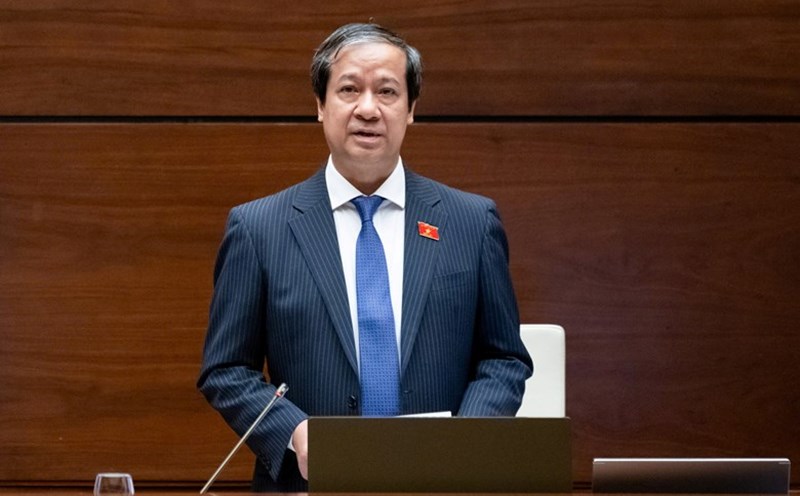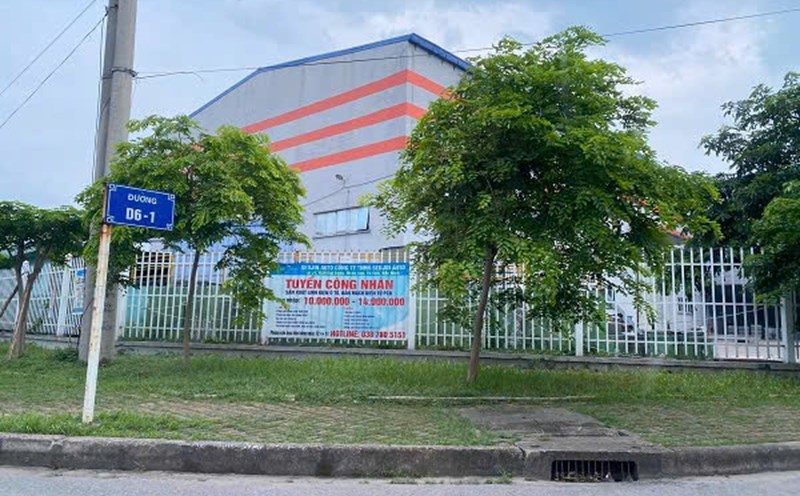10:15: Completing legal regulations on extra teaching and learning
Speaking at the end of the questioning, Politburo member and National Assembly Chairman Tran Thanh Man said that at the session, 43 National Assembly deputies asked questions, 12 delegates debated; and 23 delegates registered but had not been asked questions due to running out of time.
The questioning session took place enthusiastically, in a spirit of construction and high responsibility. Minister Nguyen Kim Son has basically answered all the issues raised by delegates, and also frankly acknowledged the limitations and commitments on perfecting policies and laws as well as solutions for implementation in the coming time.
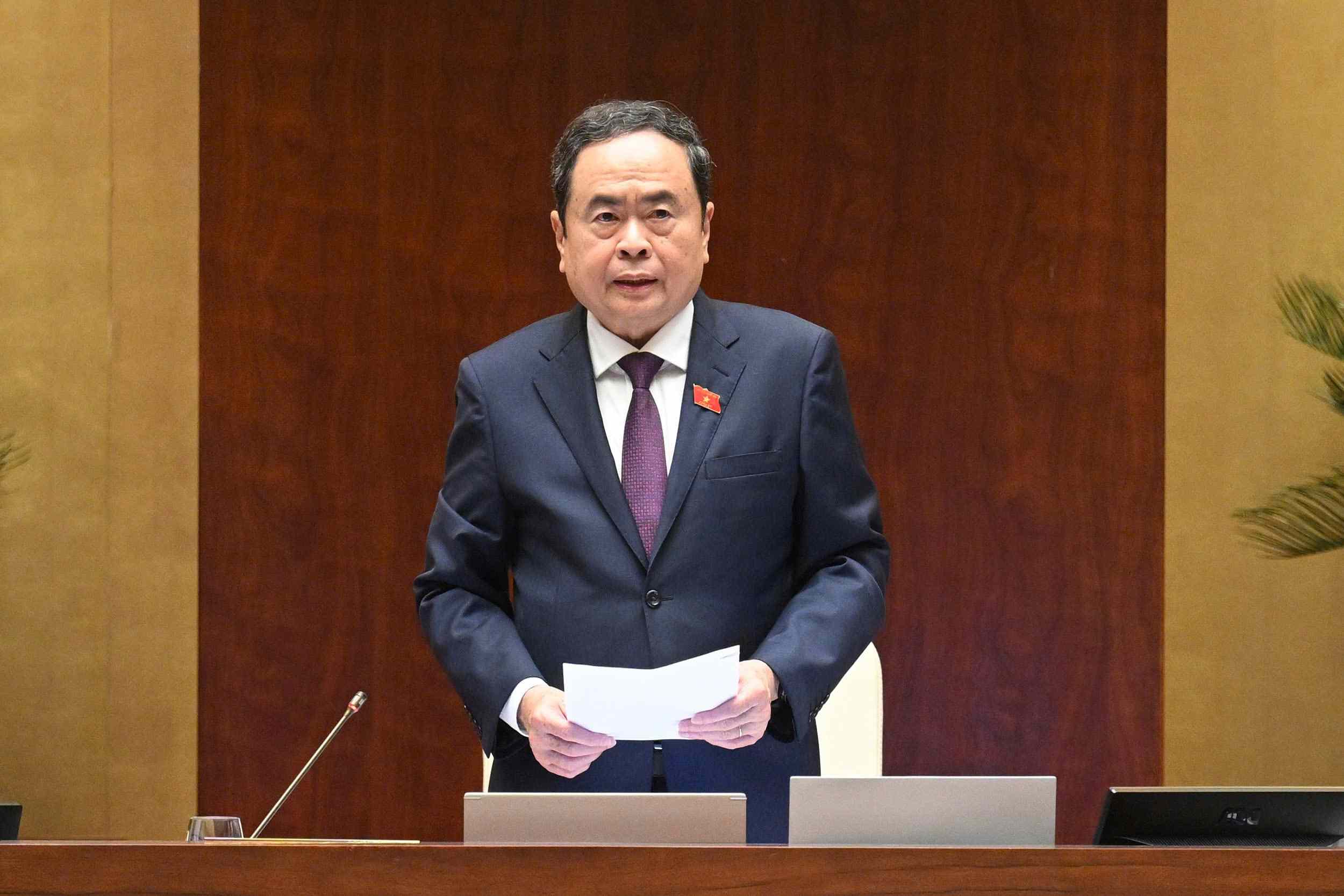
According to the National Assembly Chairman, in recent times, the education and training sector has achieved many important results: higher education continues to be innovated, creating changes in the quality of human resource training and scientific research.
The team of teachers and basic education managers has been standardized; facilities and teaching equipment have been improved.
Coordination between schools, families and society in moral and lifestyle education for students is focused on, contributing to better ensuring a safe, healthy and friendly educational environment.
In addition to the achieved achievements, there are also limitations that need to be overcome in the coming time such as: the implementation of autonomy in higher education is still confusing, and awareness is not adequate.
Higher education is not really linked to the labor market, not meeting the human resource requirements for new economic and high-tech sectors. Admissions, dissemination of universities, psychological consultation in school education, extra teaching, extra learning, reducing program load... still have problems.
Scientific research activities associated with training still have many limitations. School violence is still complicated.
The situation of students dying from drowning and traffic accidents is still a concern. The control of the quality of school meals in some places is not strict, posing a potential risk of food safety and hygiene.
The National Assembly Chairman suggested that the Government and ministries continue to focus on reviewing and perfecting mechanisms, removing bottlenecks in institutions, decentralization, and delegation of authority; improving the effectiveness of state management, planning universities, and establishing an advanced university governance system.
Develop a team of lecturers and scientists with sufficient capacity and qualifications to teach in the field of basic science, key engineering and technology majors. Completing legal regulations, guiding, disseminating, and communicating more clearly about extra teaching and learning.
Increase investment in facilities, ensure the implementation of the policy of organizing 2 teaching sessions/day. Strengthen the application of artificial intelligence, smart teaching equipment, innovate methods and forms of testing and evaluation, and further improve the quality of main school lessons.
Applying digital transformation to provide information to parents and students, supporting students to study more effectively. Continue to disseminate and direct strict implementation of regulations in ensuring a safe, healthy, friendly educational environment, preventing and combating school violence.
Focus on building school culture, fully and substantially implementing cultural code of conduct in schools. Coordinate between relevant agencies to handle and remove offensive information with violent content towards children and students on social networks.
Allocate enough resources to ensure the quality of school meals. Strengthen inspection and examination to mobilize the participation of the Parents' Representative Board in monitoring food safety and school hygiene at educational institutions. Coordinate the implementation of health protection solutions for students, prioritizing safe swimming teaching and legal education on traffic safety and order.
10:10: Proposal to soon implement the 2-session/day learning policy
Continuing to debate the issue of managing extra teaching and learning, delegate Nguyen Bich Ngoc (Hoa Binh province) cited the regulation in Circular 29 "teachers who are teaching at schools are not allowed to teach extra classes outside of school with fees collected from students that the teacher is assigned to teach by the school".
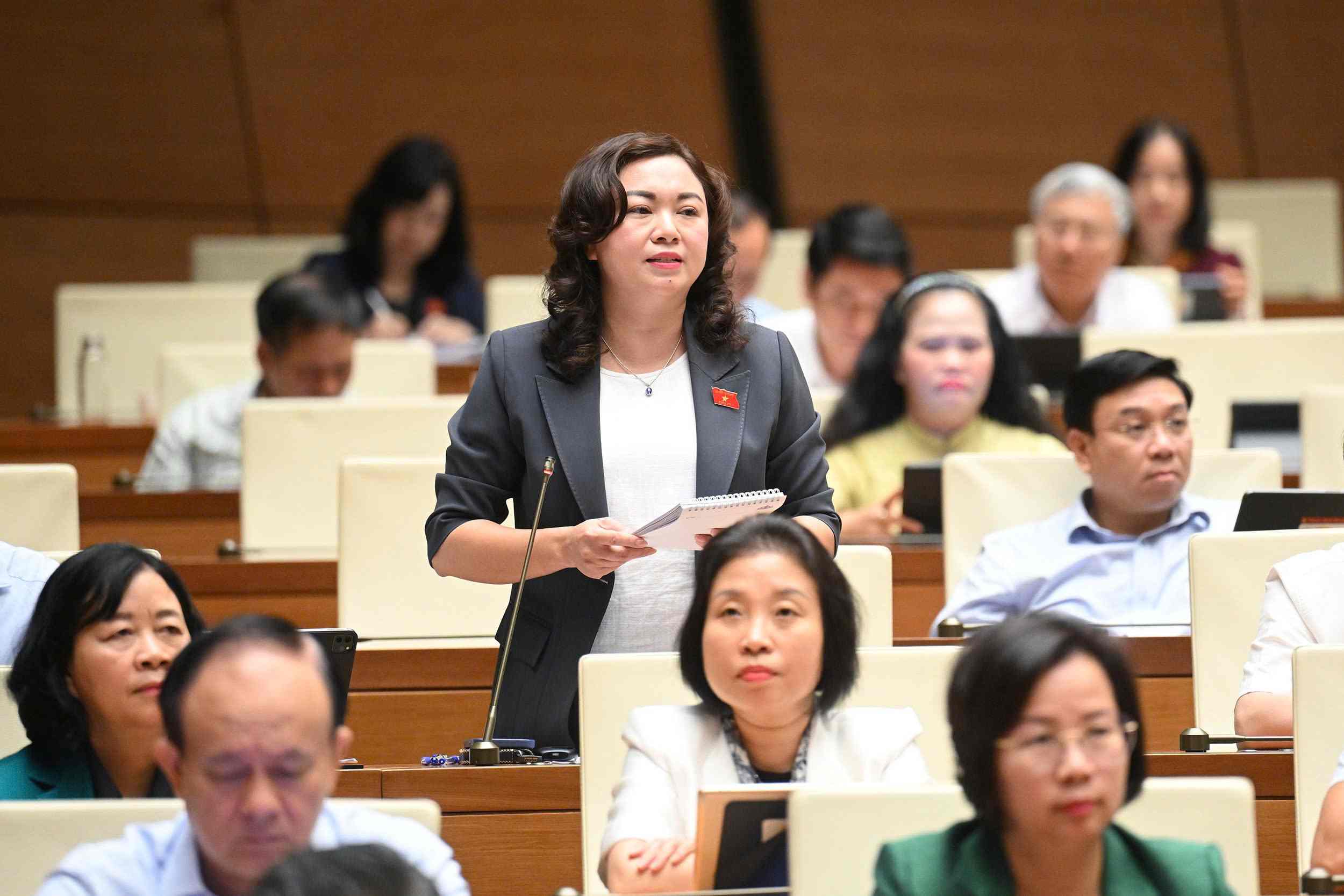
Regarding this content, the delegate said it was not suitable - "because in reality many teachers are very good, parents want and need their children to take extra classes for these teachers. But now, if we want to learn from parents, we have to circumvent the law and change it in many forms, leading to public outrage in recent times".
The delegate also said that he had received many opinions and concerns from voters on this issue before attending the session.
Regarding the solution proposed by the Ministry of Education and Training, the delegate said that it is necessary to focus on controlling and adjusting the teaching and testing program to be suitable so that parents and students can truly feel secure, just studying at school still has enough knowledge.
In the coming time, we must continue to change the content and teaching program to meet the practical needs of parents and students.
Delegate Trinh Xuan An (Dong Nai province) expressed his agreement on the policy of teaching 2 sessions a day. At the same time, it is proposed to do what it is possible to implement the policy as soon as possible - "of course we cannot do it every day, but if there is a good method, we can do it".
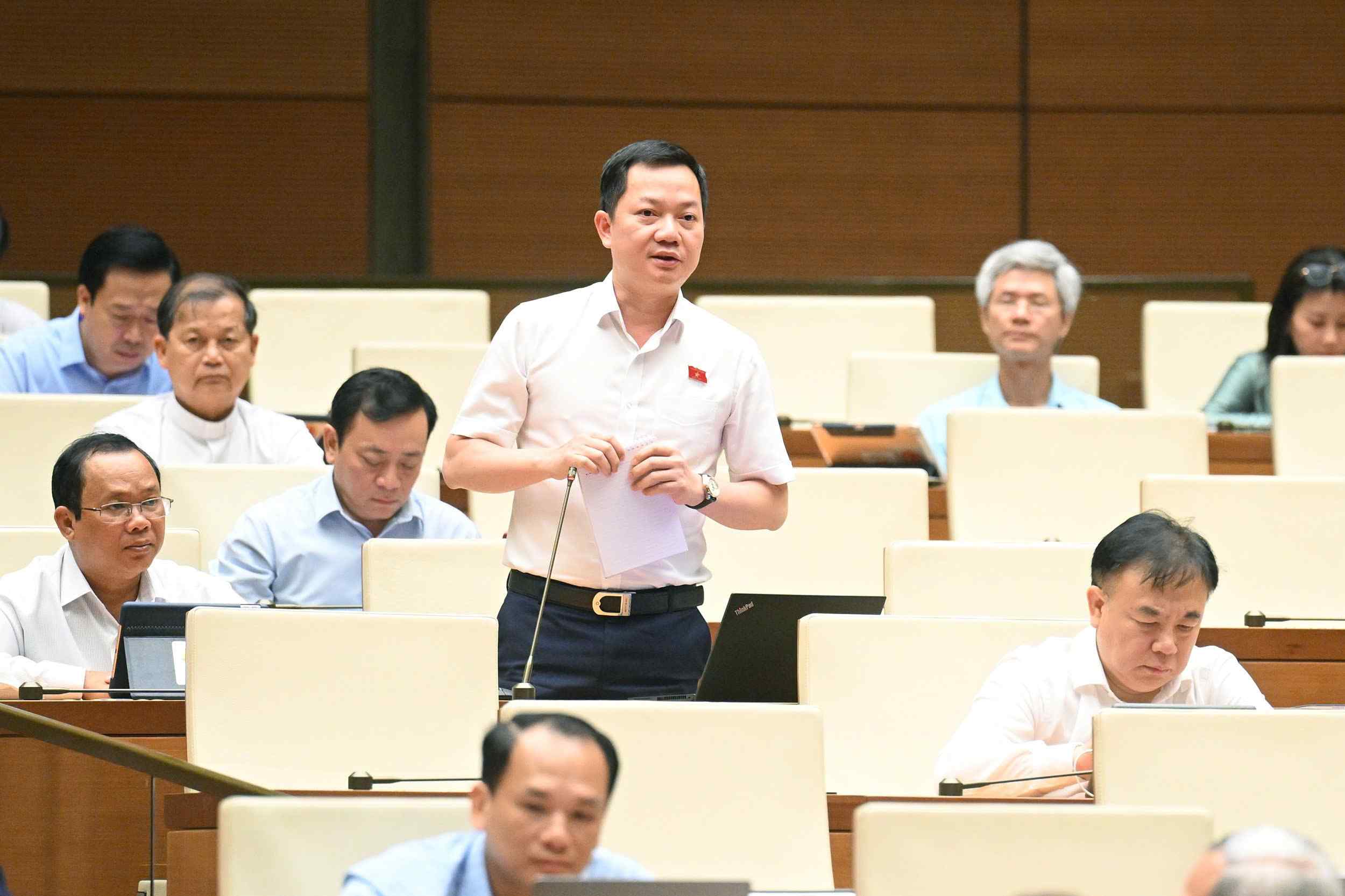
The delegate said that in reality, private schools have been practicing 2 sessions/day for a long time. These schools are doing so because they collect money from tuition fees to invest in facilities. However, the delegate mentioned that in the question-and-answer session, Minister Nguyen Kim Son said "no fee is collected".
The delegate said that if above, where should we get the money to implement this policy? From there, it is necessary to have truly drastic and practical solutions related to finance.
"This responsibility is not only the responsibility of the Ministry of Education and Training but also of localities, especially in the context of rearranging facilities after the rearrangement, localities have to invest in schools and arrange funding...", delegate Trinh Xuan An stated. Regarding the above debate opinions and some questions from other delegates, Minister Nguyen Kim Son said that there will be a written discussion to be more thorough because the answering time has run out.
Minister of Health: "There is still a phenomenon of reduced standards and quality of students' meals"
10:07: Participating in clarifying a number of issues that National Assembly deputies are concerned about regarding the quality of school meals and ensuring food hygiene and safety, Minister of Health Dao Hong Lan affirmed that this is an important task.
According to the Minister, in recent times, the Ministry of Health has coordinated with the Ministry of Education and Training to develop and deploy many documents and circulars on the implementation of occupational safety and hygiene in educational institutions, etc.
The goal is to ensure food hygiene and safety in schools, prevent food poisoning and food-related diseases.
"The goal is higher, ensuring quality meals and ensuring nutrition for a young generation of the country. Every student, teacher and staff in educational institutions must strictly implement regulations on food safety and hygiene and promote awareness of ensuring food safety" - Ms. Lan emphasized.
The Minister of Information informed that in 2024 alone, the Ministry of Health has focused on deploying 354,820 facilities, detecting 22,073 facilities violating food safety.
Handling more than 9,043 cases, equivalent to 40.9%, the number of fines is over 33 billion VND However, Ms. Lan also admitted that food safety problems in schools still occur due to many reasons such as weather conditions, processing methods, improper implementation, standards, etc.
"Another reason is how to ensure transparency in the implementation of providing meals for students, including the quantity, quality of funding sources, and the issue of inspection and supervision in the implementation of all of this content. In some places, the implementation has not yet ensured compliance with regulations, and there is still a phenomenon of reduced standards and quality of meals for students. This is something that needs to be focused on and strengthen supervision, said the Minister.
The head of the health sector set a goal of professionalizing the management and control of food safety and hygiene, school meals. Because according to her, there are many forms of organizing boarding meals.
"Some places have production service companies, some places have teachers cooking for themselves, or hiring people to cook. Therefore, ensuring general standards is still difficult. We are ready to coordinate with the Association of Small and Medium Enterprises and the Ministry of Education and Training to implement and clarify the responsibilities of each agency as stipulated in legal documents" - the Minister said.
10:05: Will strengthen supervision of school violence in private schools
Responding to questions from delegate Ta Thi Yen (Dien Bien delegation) about concerns that private schools may "escape" handling school violence to attract students, the Minister affirmed that this issue is not unique to the public or private sector.
"School violence cannot distinguish between public and private, it is a common problem," the Minister emphasized.
According to him, surveys and investigations show that this phenomenon occurs in both school systems. However, the Minister also admitted that there may be private cases that have not fulfilled their responsibilities in thoroughly handling the cases.
To solve this problem, the Minister proposed specific solutions. First, strengthen inspection and supervision. The responsibility for supervising private schools has been delegated to the Department of Education and local authorities.
The Ministry will pay attention to and direct these units to strengthen inspection and supervision of the private school system. Second, evaluate and issue stricter regulations. The Ministry will conduct further surveys and assessments. If really necessary, the Ministry will issue regulations to manage this system more closely to ensure a safe and healthy school environment.
9:20: Enterprises need to place orders with universities for science and technology products
Responding to the question of National Assembly delegate Tran Thi Thu Dong (Bac Lieu delegation) about the method of creating a link between scientific research in schools and the needs of businesses, Minister Nguyen Kim Son said that this is a meaningful question of the times when we are actively implementing Resolution 57 of the Politburo on the development of science and technology and national digital transformation.
The Minister said that Resolution 57 has opened up difficulties in transferring science and technology products, creating new connections between schools and businesses.
However, he also acknowledged that in reality, there are still problems, such as limited equipment and laboratory systems at higher education institutions.
Meanwhile, to have science and technology products with advanced technical qualifications, the laboratory system must innovate because "the production is too late to sell to anyone".
He also frankly pointed out the reality that scientific research has long been little applicable and rarely meets the technological requirements of businesses.
Meanwhile, from the business side, there are not many schools that "book".
"Enterprises, especially small-scale enterprises, do not have much demand for scientific and technological innovation, while large-scale enterprises declare scientific and technological innovation but buy a lot of technology from the world" - the Minister stated the reality.
Regarding solutions, the Minister emphasized the need to coordinate both factors, schools and businesses. Businesses need to invest in universities in equipment, make papers and place orders.
As for businesses of certain scale, they must set up their own laboratories and have sanctions to use domestic science and technology to promote the development of universities.
The important thing, according to the Ministry of Education, is the two-way relationship to connect universities and businesses. And to do this, it is necessary to have the role of 3 houses in this matter, including the State, schools and enterprises to commercialize science and technology products.
9:10: Strengthening management of some training groups and state management at the doctoral training level
Delegate Nguyen Ngoc Son (Hai Duong Delegation) commented that university autonomy has not brought the desired results, suggested that the Minister provide practical institutional solutions for implementation, in aspects such as output financial mechanisms, orders, policies to encourage private enterprises to participate in higher education or expand the scale of training but quality is the center... Delegates asked about institutional breakthroughs in the development of universities and asked the Minister to inform about this issue.
Responding to questions, Minister Nguyen Kim Son said that the content of the delegates set out a direction to solve the problem of university autonomy. This issue needs to be done synchronously and comprehensively.
According to the Minister, the education sector is working on and is about to submit to the National Assembly a synchronous amendment to 3 laws, paying special attention to adjusting and amending the Law on Higher Education.
From there, the provisions of the law on the organization and operation of higher education institutions will be adjusted. For more than 10 years, this Law has been the legal basis for implementing university autonomy and has brought many results.
The Minister said that the new period needs to bring university autonomy into depth and substance. During the law amendment process, the focus will be on strengthening the connection between the university, vocational education and general education systems.
The Minister mentioned the important point that he would ask for opinions on is that the autonomy of universities does not take the basis of financial autonomy as a criterion. From there, it will combine state support with mobilization of socialization in education.
Regarding internal governance, the Minister informed that the mechanism of heads, school councils, composition structure, and coordination functions will be discussed.
In addition, the Minister said that he will strengthen management of some training groups and state management at the doctoral training level. When implementing stronger decentralization and delegation of authority, it is expected to reduce administrative procedures by over 50%.
9:03: issuing Circular 29 is for management, not for ban
Speaking in the debate, delegate Nguyen Van Than (National Assembly Delegate of Thai Binh Province, Chairman of the Vietnam Association of Small and Medium Enterprises) expressed that he was not really satisfied with the Minister's answers on the issue of extra teaching, learning and meals for students.
The delegate said that his point of view is to teach extra classes and extra classes, which should not be banned: "Teachers are good at some people, but students are eager to get better or want to be better, let them teach them. As for the collection of money, it is an agreement between the two sides, fair".
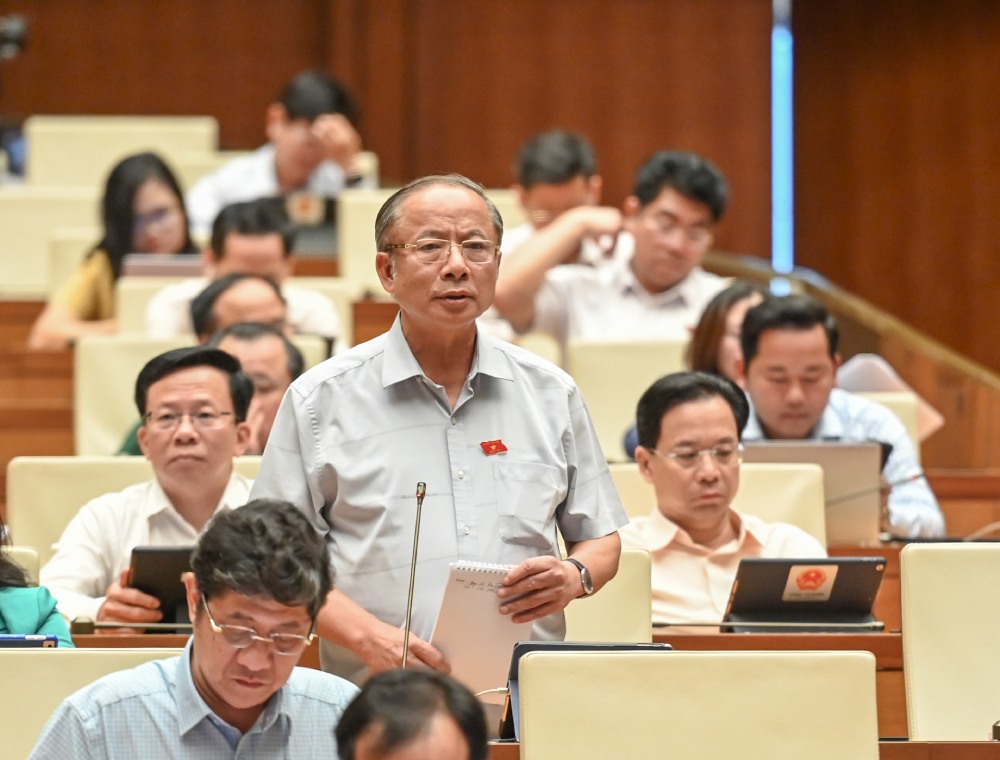
From there, the delegate suggested that teachers who teach directly are allowed to teach but are not allowed to collect money.
" Suppose someone takes money, if you don't know, you don't care, just think like that for free, don't think about having to check.
"Families with good children study a lot, while people also travel around the world to find extra teachers, people spend as much as they need," said the delegate.
Regarding the issue of student meals, the delegate said that in reality, it is very difficult to check regularly but can only be checked suddenly, every period.
"I have such an initiative, our association is willing to sign with the Minister of Education and the Ministry of Health, to come up with a healthy menu for the children, as long as we do not have group interests here, I think we will do it, not difficult. The state has given the children money to eat, but if they can't do it, then why do it? And I suggest that this must be done immediately," said delegate Nguyen Van Than.
Regarding the debate of the delegate, Minister Nguyen Kim Son affirmed that in the content of Circular 29, it is not forbidden to teach extra classes - "if students want to find good teachers to study extra classes, no one should prohibit them. Just note for teachers, for students who have taught and studied together in class, do not drag each other to the center to teach anymore. Because there, when there are benefits, transparency and conflicts of interest will take place. Therefore, according to the Minister, teachers are only prohibited from directly teaching their own students.
The Minister also said that from Resolution 29 of the Party to the Law on Teachers that has just been passed, there is only one detail above, not another. Minister Nguyen Kim Son reaffirmed that Circular 29 issued is for management, not for ban.
9:00: Wishing to end the "horror exam" of millions of students and parents every summer
Speaking to the Minister, delegate Nguyen Cong Long (Dong Nai Delegation) was interested in improving the quality of general education.
The delegate said that the Minister said that the current general education program is too light compared to the world, but he said that it is necessary to review many policies in education, for example, student orientation. The allocation of vocational training targets is 40%.
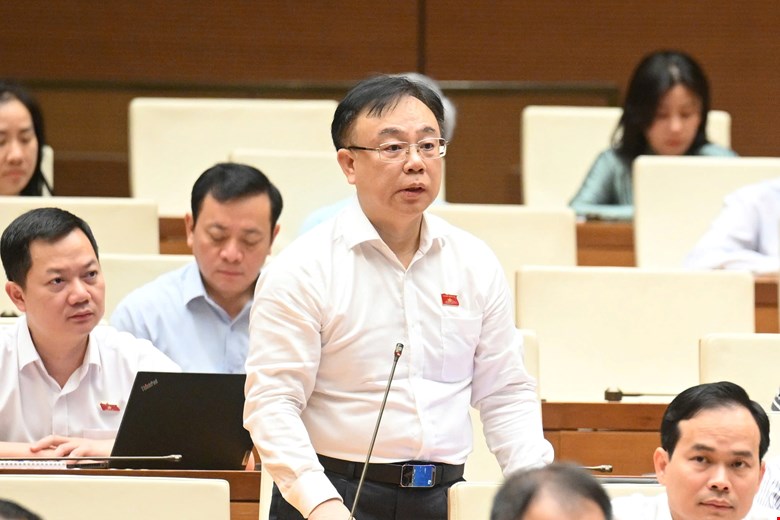
Because of this rate, it is difficult for many students to ensure their dream of going to high school because they do not have a guaranteed school due to the traffic diversion policy.
According to the delegate, in the digital age, with the requirement to improve the quality of human resources, we cannot have high-quality human resources based on a student platform with a secondary school education level.
The delegate also pointed out that the current traffic diversion policy is ineffective. For many years, parents have wanted their children to finish high school, so they have to use the high school platform to divert traffic.
From there, the delegate hopes to end the "horror exam" of millions of students and parents every summer, which is the high school entrance exam.
Responding to this issue, Minister Nguyen Kim Son admitted that dividing the flow rate by 40-60, in which 40% of students finish high school and go to vocational school, is a rigid dividing method in both theory and practice.
The information on this regulation is stated in Decision 522 issued by the Ministry of Education. Minister Son said that at this time, a document is needed to replace the above decision.
The Minister said that the Ministry of Education is proposing a replacement decree in the direction that career guidance must be practical and voluntary so that students who wish to study in high school can all study.
The Ministry of Education is proposing to amend 3 laws including: Law on Education, Law on Vocational Education and Law on Higher Education, in which it is very important to create a synchronous and smooth system of connectivity between general education, vocational training and higher education so that the flow from within is voluntary, meeting the requirements in the new period.
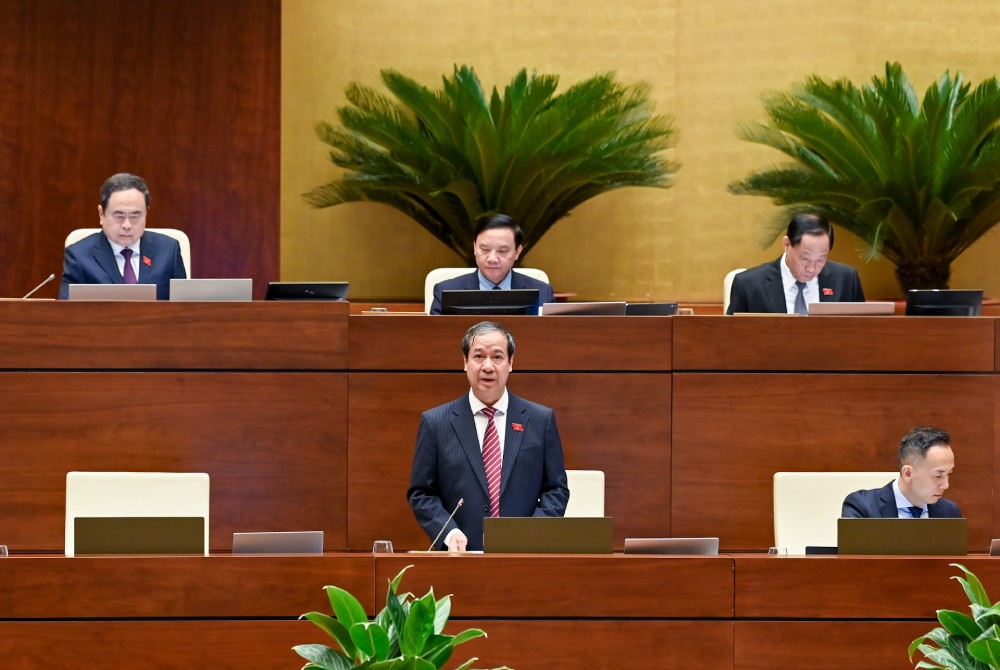
8:50: School violence on cyberspace is increasing
The delegate of the Soviet girls - Kon Tum delegation stated that in reality, school violence is still a worrying challenge in the education sector. The form is gradually shifting from physical violence to mental violence, especially in cyberspace.
In mountainous areas and ethnic minorities, this issue is even more worrying when students lack self-defense skills, teachers also hold many roles. The school still lacks a team of school psychology experts. Family and school coordination still faces many difficulties. How does the Minister assess this situation? The roadmap to build a healthy and humane school?" - the delegate asked the Minister of Education and Training.
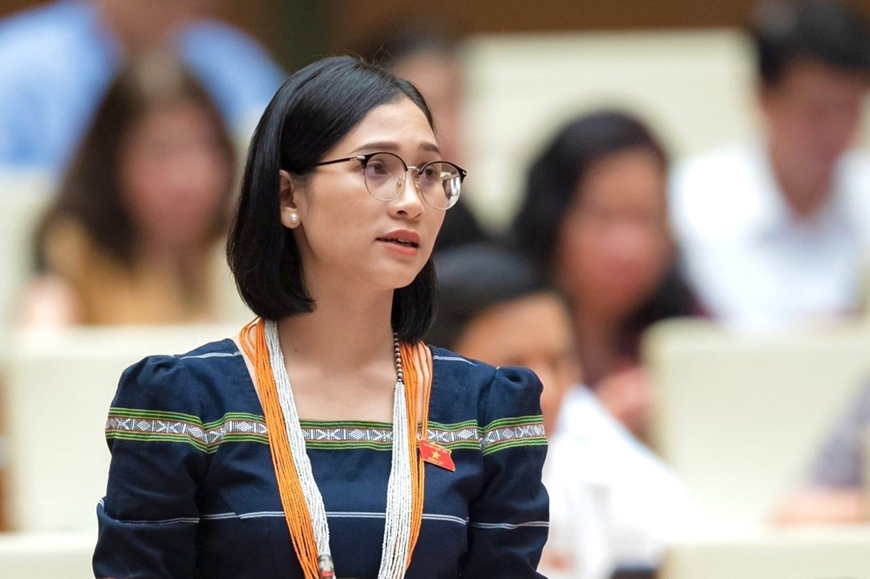
Regarding this issue, Minister Nguyen Kim Son said that to be fair, in schools in remote areas, the school problem is not as complicated as in schools in urban areas. However, he admitted that in reality, violence in cyberspace is increasingly complicated.
Among the current cases of school violence, 20 - 25% of forms of school violence are on cyberspace. The form of online bullying tends to increase and become more and more complicated. In preventing school violence, it will be necessary to focus more on the issue of online violence and bullying in cyberspace" - the Minister said.
8:40: A backward country, a slow economic development, and having universities in the top group in the world is extremely difficult
Delegate Trinh Thi Tu Anh (Lam Dong) questioned the ranking of higher education in recent times: "In 2025, Vietnam will have 10 representatives in the world university rankings, including 4 schools in the top 1,000.
To achieve the goal of having at least 5 higher education institutions in the top 500 best schools in the world by 2030, 5 educational institutions in the top 200 in Asia as determined, what solutions and implementation roadmap does the Minister have? ".
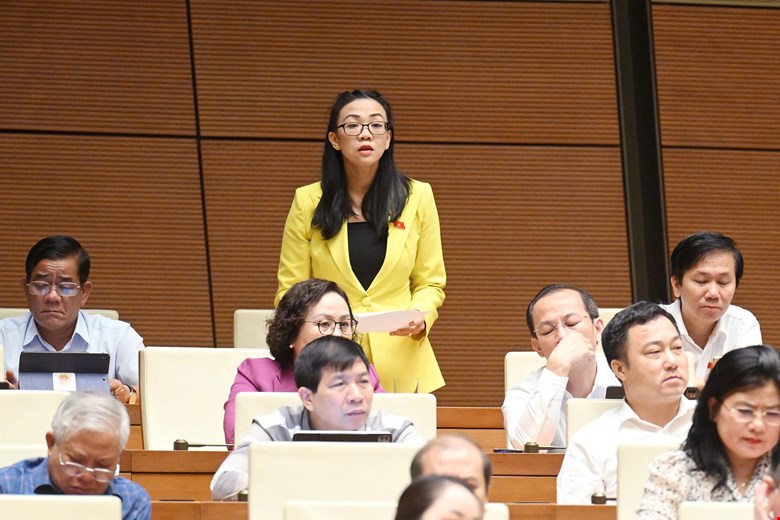
Responding to this question, the Minister said that having highly ranked universities is one of the desired things and an indicator of higher education's efforts in the vision to 2030 and vision to 2045.
We also hope that at least 5 schools will be in the top 500 of universities in the world, according to the prestigious ranking in the world.
However, the path to achieve this goal is not easy. Because the development speed of our universities in recent years has developed, increased in science and training indicators, but the development speed is not fast compared to the requirements of socio-economic development and the requirements of human development.
Because of that not-so-fast speed, the Politburo, the Secretariat, the Central Committee and the Government are also proposing many policies to promote the development and increase the quality of universities that need to be faster to meet the requirements of socio-economic development of the country. The rankings of universities and the development of the economy are also a system and correlate with each other.
Of the top 200 universities in the world, most are from countries in the G7 and China. Therefore, if a country is backward and has a slow economic development and has universities in the top group in the world, it is extremely difficult.
Therefore, in addition to increasing the speed of economic development, universities must also make every effort to improve quality, increase science and technology products to improve on the rankings. The rankings are also an international comparison to show where we are.
However, it is also a thing, the ranking is just a channel to evaluate universities. And many rankings are also based heavily on international publications and international articles.
Therefore, in addition to international publications, a very important part is solving practical problems, major problems of the country and inventions, inventions, useful solutions, solving problems of real life, contributing to the country, which is an even more important thing for universities, especially in this new period.
8:30: It is necessary to propose a roadmap and targets to gradually reduce the situation of extra teaching and learning
Delegate Nguyen Quang Huan (Binh Duong Delegation) assessed that through the issues answered by the Minister, it can be seen that the education sector and the Minister alone are solving many difficult and "hot" problems and are of great concern to voters and society, including the issue of extra teaching and learning.
However, the delegate said that the Minister has given many reasons and solutions to solve the problem of extra teaching and learning to meet voters' expectations - "but if it is not popularized into the main cause group, it is possible that there will not be a synchronous solution, and the problem cannot be solved in a fundamental way".
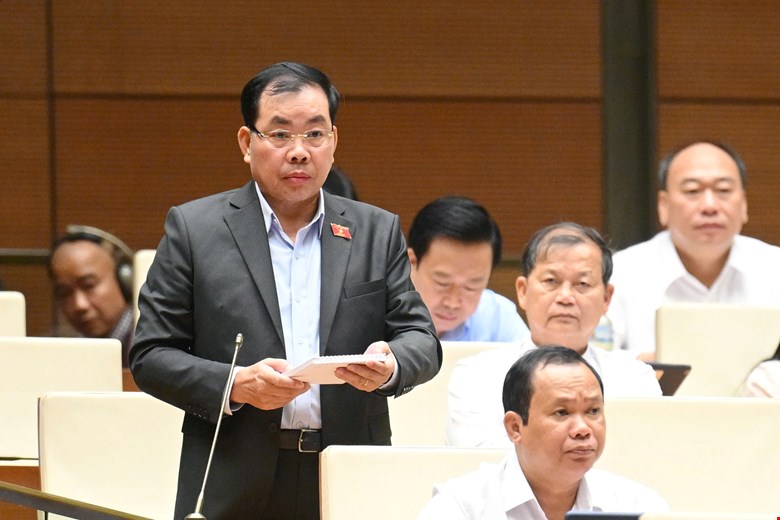
The delegate assessed that there are two main groups of reasons leading to the situation of extra teaching and learning - economic and social.
Firstly, in terms of economy, our country is developing, so we have not been able to concentrate resources, leading to low teachers' salaries, and insufficient teachers and schools. At the same time, it has not focused on the issue of communication to raise awareness in a synchronous manner.
In addition, our economy is not yet a modern industrial economy, so the ability to choose a job for high school students is a limited problem, thereby leading to focusing on studying to find a job.
Second, there are two issues in society: social psychology and social institutions.
"Our country comes from a country that is studious, this is an advantage for social development, however, leading to another problem, the weight of the group", said delegate Nguyen Quang Huan.
Regarding social institutions, the delegate said that the selection of personnel is not yet practical, still focusing on qualifications and certificates. Parents themselves are often under pressure to get a degree on themselves.
From the above realities, the delegate said that it is necessary to propose solutions for inspection and supervision. On the other hand, we must follow objective rules.
It is important that the Ministry of Education and Training must provide a roadmap and targets (including extra teaching and learning) to strive for.
"It may gradually decrease and eliminate when we become a developed country," said delegate Huan.
After the debate of the delegates, Minister Nguyen Kim Son sent his thanks and agreed with the above opinion.
8:28: Orientation of the education sector to implement the policy of free teaching of 2 sessions/day
Delegate Nguyen Lam Thanh (Thai Nguyen Delegation) said that the policy of organizing the second session of completely free teaching is of great significance. Mr. Thanh asked the Minister of Education and Training: "The industry's orientation in upcoming implementation is to organize well, especially in the context of current facilities, arrangement of educational institutions, and 2-level government?".
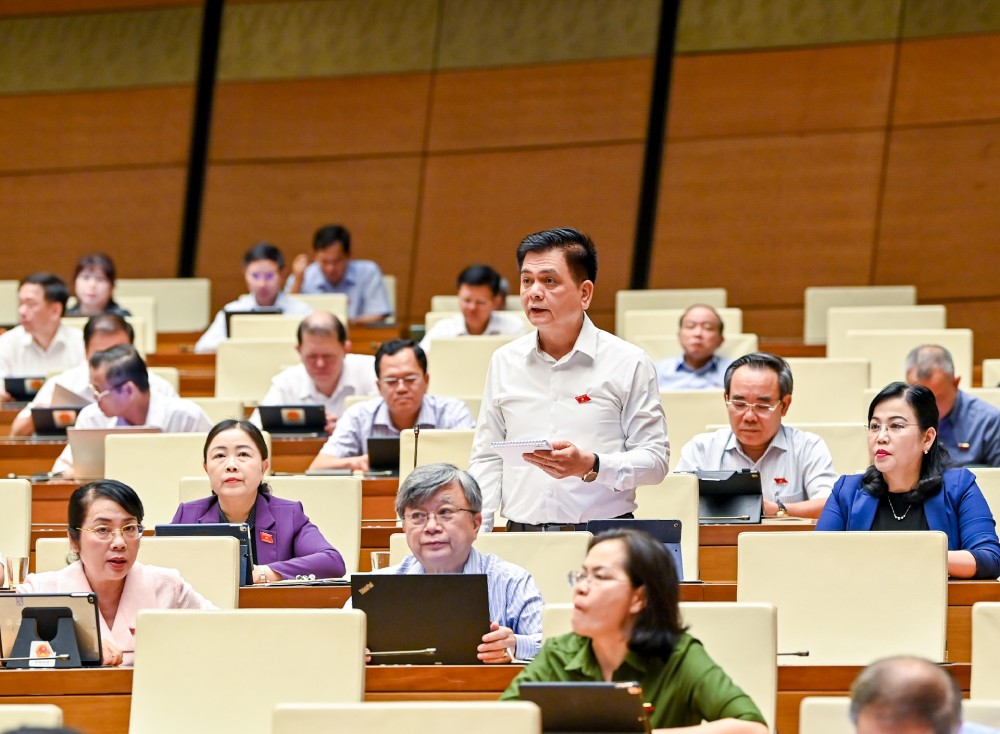
Responding to a question from delegate Nguyen Lam Thanh, Minister Nguyen Kim Son said that at this time, primary schools have implemented 2 sessions/day, reaching 99%. However, at secondary and high school levels, the conditions for organizing 2 sessions/day are still difficult, especially in many schools in large cities, the space is cramped, making it difficult to implement this.
The Minister said that, implementing the direction of the General Secretary in Notice 177, the Prime Minister has also issued Directive 17, emphasizing that from September 2025, provinces and cities will focus on the maximum conditions for organizing second lessons at schools. The viewpoint of the organization is to depend on the conditions of each place, try to the best, and not collect any fees at any session.
"School session 2 will focus on comprehensive capacity development for students such as: Sports, music, fine arts, enhancing self-study ability, life skills...
Although there are many difficulties, this is a big orientation, it needs to be done, and should be done. The Ministry of Education and Training will prepare programs and instructions, localities will need to be proactive. I hope to do well step by step. At that time, the quality of teaching and learning will be improved" - the Minister said.
8:15: Teachers must be wholeheartedly devoted to main teaching hours, not focus on extra teaching
Delegate Tran Thi Thu Hang (Dak Nong Delegation) questioned that according to the report, the Ministry assessed that the situation of additional disguise teaching in many forms is quite common, showing that there is still a lot of gap between policy and practice. Parents consider studying in class not enough to meet the exam requirements, and need to find extra classes as an inevitable solution to improve learning outcomes.
The two exists mentioned above are considered a supply-demand relationship. However, the solutions proposed by the Minister are only aimed at perfecting administrative management institutions, but the key issue to completely overcome this supply-demand relationship is to improve the quality of teaching and learning during regular hours.
The delegate asked the Minister to tell us what solutions to improve the quality of teaching and learning during the regular hours.
Responding to this issue, the Minister affirmed that this is an important issue, a solution to the problem of extra teaching and learning that is causing many concerns.
According to the Minister, to solve the root problem of widespread extra teaching and learning, the core solution is to improve the quality of regular teaching hours in class. He emphasized: "When answering this question, it also means that we are mentioning solutions to improve the quality of general education in general".
The Minister pointed out two decisive factors. In which the top important factor is the teaching staff. The Minister said: "The first important factor is nothing other than the teaching staff. Teachers must be quantity-rich and wholehearted, wholehearted for the main teaching hours, not distracted, not dispersed, and not have to worry too much about other things.
To teach a full-time quality classroom class, teachers need a lot of time to prepare, prepare papers, grade papers, conduct professional activities and support students. If time and effort are concentrated on other activities (including extra teaching), the quality of regular school hours will hardly be guaranteed.
The Minister affirmed that Circular 29 does not strictly prohibit teachers from teaching extra classes but only manages and regulates them. In addition to class hours, teachers can be eligible to participate in extra teaching activities according to regulations. However, if the number of teaching sessions outside of regular school takes up too much extra teaching time, there will be no time to focus on regular teaching hours.
Meanwhile, the 2018 general education program requires teachers to be more active, more creative, and no longer depend on textbooks. Therefore, it is even more important for teachers to focus all their efforts on the main teaching hour.
Next, it is necessary to ensure reasonable facilities and class numbers. If classes with 60-70 students are of good quality, it will be very difficult to be good. With this goal, teachers cannot innovate methods, cannot care for and look after each student.
Therefore, investing to ensure adequate facilities, teaching equipment, spacious classrooms and a reasonable number of classes is a prerequisite for implementing the education program well.
Other synchronous solutions include reviewing programs, applying information technology, enhancing databases and libraries for students to self-study, and innovating in testing and evaluation.
8:10: Proposal to transfer unit for controlling meal quality to the Ministry of Health
Responding to the question of Delegate Nguyen Hoang Uyen (Long An Delegation) regarding the issue of food control, ensuring the provision of safe food and meals for students, Minister Nguyen Kim Son said that this is a big problem, requiring the participation of many sectors and many units.
Regarding regulations and institutions, according to the Minister, currently, guiding documents on food hygiene and safety are almost all joint circulars between the Ministry of Health and the Ministry of Education and Training.
"I have also proposed to unify 1 unit, which is strictly regulated by the Ministry of Health. The Ministry of Education and Training is a unit that fully implements its responsibilities, and will be more harmonious" - the Minister said.
He also added that in the coming time, he will continue to strengthen inspection and supervision by local government organizations.
"In school, it is only to check the roof. We will coordinate with the Ministry of Health to inspect the inspections of localities. In addition, there is also the responsibility of the school, medical staff... We will strengthen inspection and supervision in the coming time" - the Minister affirmed.
8:07: respondents question organizing many different exams and assessments of capacity increase exam pressure
Raising questions, delegate Do Thi Viet Ha (Bac Giang delegation) said that according to Circular 06 and amended and supplemented by Circular 08 of the Ministry of Education and Training promulgating regulations on university and college admissions in preschool education, schools can use many admission methods, including a competency assessment test.
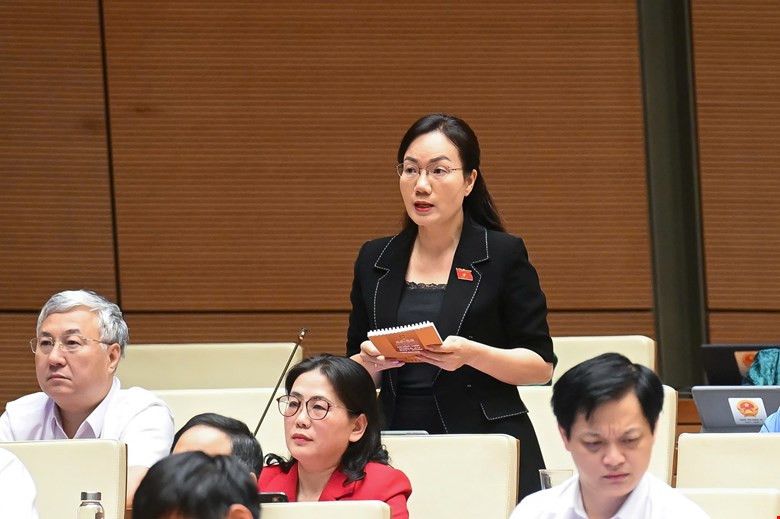
According to the delegate, voters have the opinion that organizing many different exams and assessment of abilities increases the pressure on the exam. Candidates from far away have to travel, which is expensive, and at the same time, they have to review many different content and test types, reducing the time to focus on the main curriculum. What is the Minister's opinion on this and solutions to overcome it in the coming time?
Responding to this issue, Minister of Education and Training Nguyen Kim Son said that according to the regulations on autonomy, universities are autonomous in enrollment. Currently, in addition to the general high school graduation exam, there are 5 educational institutions that organize separate exams with different names, most of which are competency assessment exams. Of which, 5 places attract over 10,000 candidates to take each exam.
However, the Minister emphasized an important figure: "According to statistics and surveys, the number of candidates using the results of the competency assessment exam to consider admission and admission to universities is only 3%."
The Minister affirmed that participating in these exams is "voluntary choice" of candidates. First of all, it is necessary to increase opportunities for candidates and universities.
According to Minister Nguyen Kim Son, these separate exams can be considered an important experiment in science of testing and evaluation. These exams are applying modern technology such as computer exams, and candidates can know the results immediately.
"This is also an experimental level of scientific testing to evaluate and provide experiences for the innovation steps in the graduation exam and university admission in the coming years," he analyzed.
The Minister also revealed the roadmap for innovation: according to the plan, from 2027, the high school graduation exam will be piloted on computers in places that meet the requirements. He believes that the experiences from current separate exams will help towards a high level of unity in exam preparation and admission, based on the scientific foundation and application of information technology, thereby "reducing unnecessary pressure on learners in the near future".
The group of questions for Minister Nguyen Kim Son has the current situation and solutions for development, improving the quality of higher education in conjunction with the requirement of training high-quality human resources, meeting the requirements of socio-economic development.
The implementation of legal regulations on extra teaching and learning is a current issue, which will also be clearly answered by the commander of the education sector in his forum.
Minister Nguyen Kim Son also answered about the work of ensuring a safe, healthy and friendly educational environment; preventing and combating school violence; ensuring food safety and hygiene in schools.
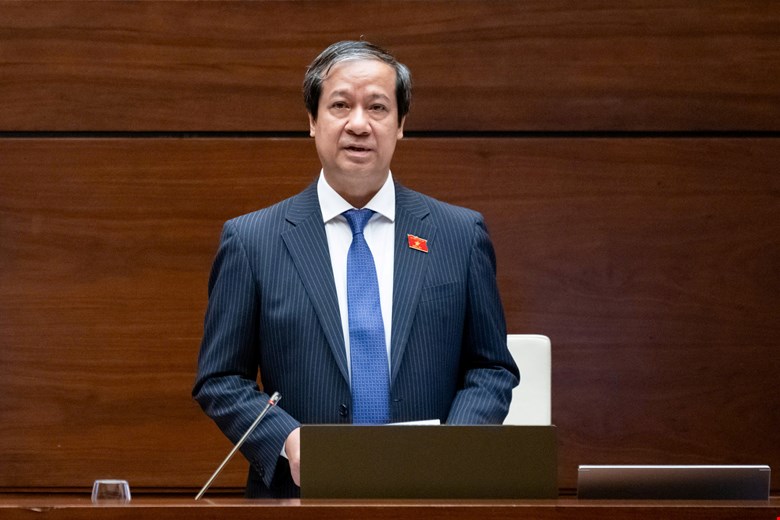
Previously, in the questioning session on June 19, there were many issues raised by delegates, requesting the Minister of Education and Training to clarify, in which, the group of contents related to extra teaching and learning continued to "heat up" the National Assembly.
There were many questions raised by delegates and as commander of the education sector, Minister Nguyen Kim Son affirmed his consistent view: The Law on Teachers and the circular both strictly prohibit teachers from forcing students to participate in extra classes in any form.
In the case of students who are volunteers and have a need to study outside of regular school hours, the Minister noted that teachers should be guided to self-study and use the second lesson effectively, not students who need to " study more to teach more". Because according to him, limit extra teaching in and out of school, especially in school so that students have time to self-study, read documents, study subjects related to skills, and equip themselves with other necessary things.
The head of the education sector also said that the Ministry has advised the Prime Minister to issue a directive to prepare for the second teaching session.
"To organize a second teaching session, there must also be a process, which means having time for other things, not just having time to "open up and teach old knowledge" - the Minister affirmed.
Not only do students have the need to teach, but here we must ensure that children are safe.
They have to have time to play and learn other things. When designing the 2018 high school program, according to the Minister, it was considered that the main curriculum in the school plan can ensure the requirements.
"In this case, not all students volunteer to meet the needs in school" - the Minister added and emphasized that there are many issues to discuss in extra teaching and learning.


